When I was 10-years-old, my parents finally got me a dog. Spike changed my life in an instant. I was in charge of walking, feeding, training, and bathing him – and I adored every second of it! Not only did the experience reinforce my passion for dogs, it taught me empathy, responsibility and unconditional love.
Dogs do so much more for developing young minds than just provide a waste receptacle for unwanted broccoli. They have countless lessons to teach, moments to enhance, and health benefits to share. Here are 9 reasons every kid should grow up with a dog!
1. Babies who live with dogs get sick less.
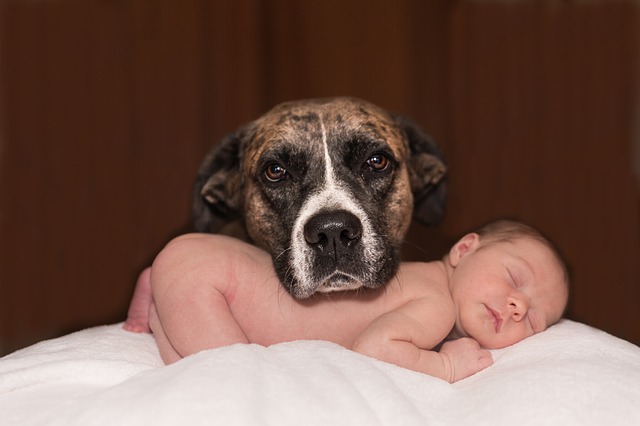
Researchers at Kuopio University Hospital in Finland conducted a study of nearly 400 infants born during a two-and-a-half year period. They found that during their first year of life, babies who lived with dogs experienced fewer illnesses, shorter bouts of ear and respiratory infections, and were less likely to need antibiotics than infants from pet-free homes.
The team theorized that dirt and germs brought in by the family dog caused the babies’ immune systems to mature more rapidly, making them better prepared to fight off viruses and bacteria that cause respiratory problems. It is now referred to as the “hygiene hypothesis,” and its validity is widely accepted in the scientific and pediatric communities.
2. Growing up with a dog may prevent allergies.

Another study conducted by the Department of Pediatrics at the University of Wisconsin found that infants exposed to dogs – especially around the time of birth – were about 50% less likely to develop certain allergic diseases.
As with the Finnish study, the researchers suspect that early exposure to pet-related allergens and bacteria strengthens the immune system and prepares it to fight off future attacks. The key seems to be exposing babies to dogs immediately after birth – kids who got a pup after one year of age did not enjoy the same health benefits.
3. Kids with dogs get more exercise.
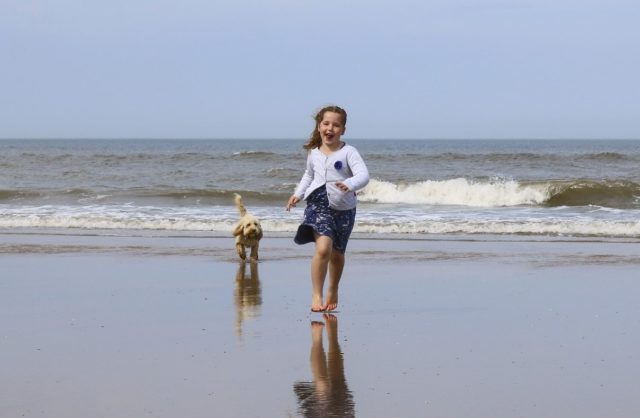
With childhood obesity rates and incidences of Type II Diabetes soaring, exercise is more important than ever. However, it can be difficult to get kids to go outside and play when the lure of their electronic devices is so strong.
A study published in the American Journal of Public Health, found that children with dogs spend 11 more minutes per day engaged in physical activity than those without dogs. While this might not sound all that significant, pup-owning kids were also found to spend 11 minutes less in sedentary behaviors each day, and take 360 more steps than the dogless children.
4. Dogs help kids learn social skills.
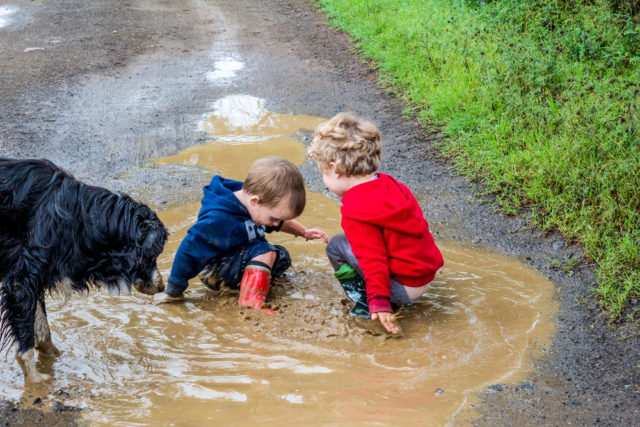
When a child lives with a dog, he or she must learn to be gentle, kind, and sensitive to the animal’s likes and dislikes. Instead of everything being all about the child all the time, having a dog promotes sharing, considerate play, and of course, introduces them to the concept of unconditional love!
A study comparing the social and emotional development of children with dogs at home to those without, found that kids with dogs are more social and empathetic, and report more positive feelings about their families, as well as more feelings of safety in their homes.
5. Having a dog teaches responsibility.
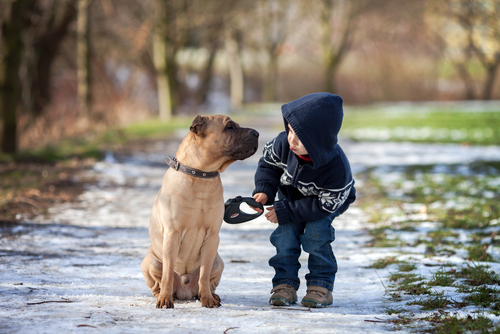
According to a survey conducted by the American Pet Product Association, 58% of pet owners say having a dog helps teach their kids responsibility. Experts recommend involving children in the care of the family dog with age-appropriate tasks such as feeding and walking for older kids and refilling the water bowl for youngsters.
It is also helpful to teach them that dogs have many of the same physical and emotional needs they do, allowing them to see them as living, breathing creatures instead of possessions.
6. Dogs are built-in buddies.
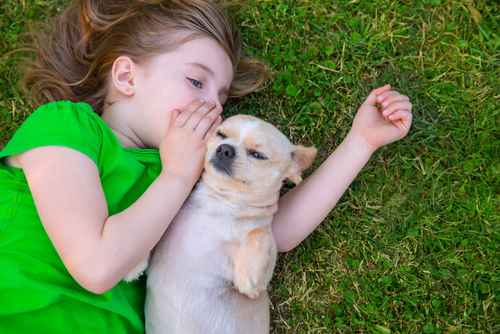
All children have moments of sadness and loneliness. Whether they have trouble making friends, go through the strain of moving to a new town, or suffer the effects of bullying, a loyal dog ensures they always have a companion to turn to!
Dogs are great at keeping important secrets, licking away tears, fighting imaginary monsters, and attending tea parties. Best of all, they are incapable of passing judgment – something kids already deal with from their peers on a daily basis.
7. Training a dog reinforces the importance of manners and respecting others.
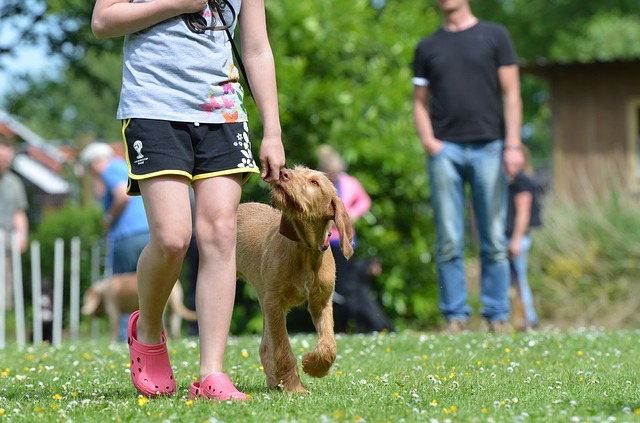
Many trainers recommend involving children in the training process to ensure that the dog and child form a healthy bond and learn to respect one another. Through the use of positive training techniques, kids learn to interact with others in a caring, mutually beneficial way, rather than simply demanding what they want.
Not only does this ensure a lifelong bond between dog and child, it teaches vital skills kids can utilize in their interactions with friends, classmates and siblings.
In addition, seeing the family dog receive treats and praise for obeying commands can help younger children see the benefit of good behavior and manners.
8. Dogs Help Develop Reading Skills.
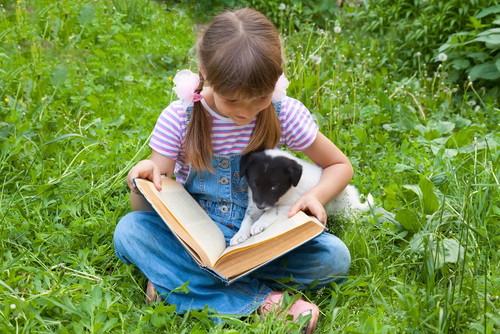
Did you know that children who read to their dogs can improve their skills level by an entire school grade? Reading aloud in front of teachers, parents or peers can make children feel vulnerable and embarrassed, but as stated above, dogs never judge. They are calm, patient, polite listeners who never interrupt with corrections or make the child feel rushed.
Best of all, reading to dogs is fun! Instead of being stuck inside at a boring desk, kids can take the dog outside to their favorite spot and turn reading aloud into their own solo performance to an adorable audience of one. What a confidence booster!
9. Having a dog helps encourage the next generation of animal advocates.
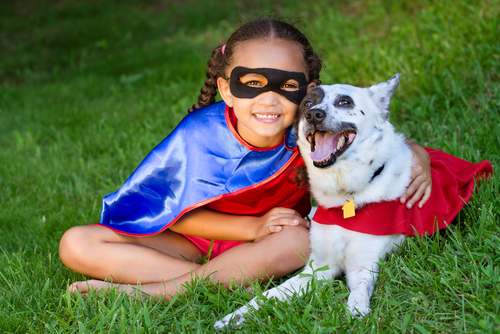
There are far too many dogs abandoned, abused and exploited in this world. They need strong, passionate humans to fight on their behalf. Kids who grow up with dogs are more confident, empathetic and respectful of other living things – just the kind of future heroes animals need!
 Toledo, United States.
Toledo, United States.
